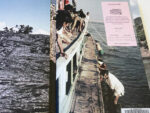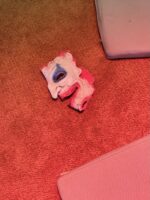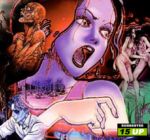10am - 5pm @ a.pass, 3rd floor
The workshop disseminated escapes focuses on the intertwining between art practice, publishing and library keeping, as means to ensure a suitable knowledge context for research-based art practices to exist. With the imminent future of the post-graduate program in doubt, we take a.pass library as a contextual framework, in order to reflect on questions regarding the responsibility of maintaining spaces and networks that foster a more diverse, queer, feminist, and non-hegemonic set of references and knowledge. We will deal with issues such as collectivity, connection, knowledge production, maintenance, responsibility, generosity, boundaries, funding cuts, continuation, letting go, and deaccession, and how they could be considered and dealt with as part of one’s practice.
Part of the workshop will be dedicated to the slow work of accessing the current state of a.pass library, meaning the gathering, sorting, checking against the catalog and placing the collection of books back in their bookshelves. While handling the books and through the repetitive task that is maintaining a library we search for pencil marks, underlined sentences and paragraphs, notes, doodles, as well as folded page corners left by previous participants over the years. The search for traces becomes then an exercise in reflecting on the effort and work that has taken place by others and for others. But also speculation on the potential messages these traces communicate as the library faces an unknown future with its potential relocation and/or dissolution.
Aside from the work with the collection of books, we start the two days with an introduction to the library’s history by artist and a.pass technical support Steven Jouwersma, and his experience while administering different systems for lending books, building shelves, cataloging books and maintaining the library for years. On the morning of the second day, we will be joined by the artist duo Nasrin Tabatabai and Babak Afrassiabi for a presentation on their project Pages (https://www.pagesmagazine.net), a bilingual, Farsi and English, artist magazine initiated in 2004, concerned with rethinking the politics and practice of archiving and publishing. Pages approach publishing as a collective practice of generating an open, permeable archive.
Heide Hinrichs and Vijai Maia Patchineelam met while working and researching at the Royal Academy of Fine Arts Antwerp. Heide was leading the two-year research project second shelf (2018-19) which explored the influence of the culture of the art world dominated by the concept of the lone genius, autonomous, white male creator on the library of the Royal Academy of Fine Arts Antwerp by asking how alternative canons can be generated in the library. The core of the project was the formation of a new collection of books in the library of the Royal Academy that document the work of female, non-white and non-heterosexual artists and related theoretical texts. Back then Vijai had just started his doctoral research project The Artist Job Description, a practice led research for the employment of the Artist, as an Artist, Inside the Art Institution (2016-22), which looked at the relationship between artists and art institutions. With the overlap of interests both artists entered into an ongoing dialogue that has led to moments of research and teaching collaborations.
Heide Hinrichs is an artist based in Brussels, who works with found and existing materials. She responds to situations and continues to draw lines. She was awarded the Villa Romana Fellowship for 2013. In 2014, she was a fellow at the MMCA Seoul International Residency Program, where she continued to work on her long-term project Silent Sisters / Stille Schwestern, an unauthorized translation in text and art works in conversation with Theresa Hak Kyung Cha’s book, DICTEE, brought to completion in 2018. For the first Kathmandu Triennial, 2017 (curated by Philippe Van Cauteren) Hinrichs developed the project On Some of the Birds of Nepal (Parting the Animal Kingdom of the East). Between 2018 and 2020 Hinrichs worked on the collaborative project second shelf ( https://second-shelf.org/shelf/) located at the library of the Royal Academy of Fine Arts Antwerp. The project concluded with the publication shelf documents: art library as practice, Track Report, Antwerp and b_books, Berlin, 2021, which Hinrichs co-edited with Jo-ey Tang and Elizabeth Haines. posture editions, Ghent published at the end of 2019 Morning Change, a book on movement, location and nomadism within the artist’s intuitive conceptual oeuvre. Since 2015 she has been teaching and researching at the Royal Academy of Fine Arts Antwerp.
Vijai Maia Patchineelam’s artistic practice focuses on the dialogue between the artist and the art institution. Placing the role of the artist as a worker in the foreground, Vijai’s research-driven artistic practice experiments with and argues for a more permanent role for artists — one in which artists become a constitutive part of the inner workings of art institutions. This displacement of roles is part of a larger trajectory of his recently concluded Ph.D. research titled, The Artist Job Description: A Practice Led Research for the Employment of the Artist, as an Artist, Inside the Art Institution at the Royal Academy of Fine Arts Antwerp, the University of Antwerp and a.pass, advanced performance and scenography studies, Brussels. As a final outcome of his doctoral thesis, Vijai has published the book The Artist Job Description: for the Employment of the Artist, as an Artist, Inside the Art Institution with Track Report (Antwerp), in collaboration with OAZA (Zagreb) and a.pass (Brussels).



